 Petzlover
Petzlover Alapaha Blue Blood Bulldog is originated from United States but Kanni is originated from India. Alapaha Blue Blood Bulldog may grow 6 cm / 2 inches shorter than Kanni. Alapaha Blue Blood Bulldog may weigh 25 kg / 56 pounds more than Kanni. Both Alapaha Blue Blood Bulldog and Kanni has almost same life span. Both Alapaha Blue Blood Bulldog and Kanni has same litter size. Alapaha Blue Blood Bulldog requires Moderate Maintenance. But Kanni requires Low Maintenance
Alapaha Blue Blood Bulldog is originated from United States but Kanni is originated from India. Alapaha Blue Blood Bulldog may grow 6 cm / 2 inches shorter than Kanni. Alapaha Blue Blood Bulldog may weigh 25 kg / 56 pounds more than Kanni. Both Alapaha Blue Blood Bulldog and Kanni has almost same life span. Both Alapaha Blue Blood Bulldog and Kanni has same litter size. Alapaha Blue Blood Bulldog requires Moderate Maintenance. But Kanni requires Low Maintenance
 Alapaha has a very interesting history. Their origin dates from one family that lived near Alapaha river in Georgia, in the USA 200 years ago. The family rescued dying breed of Plantation Bulldog. They actually had this breed for 80 years and every dog was named Otto. This breed was not just saved, but the family created a perfect guard dog. Alapaha Blue Blood Bulldog started to expand and by 1980s they spread through the country.
Alapaha has a very interesting history. Their origin dates from one family that lived near Alapaha river in Georgia, in the USA 200 years ago. The family rescued dying breed of Plantation Bulldog. They actually had this breed for 80 years and every dog was named Otto. This breed was not just saved, but the family created a perfect guard dog. Alapaha Blue Blood Bulldog started to expand and by 1980s they spread through the country.
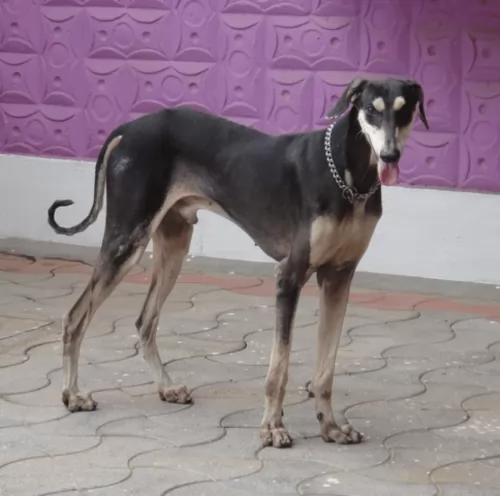 The Kanni dog is a rare South Indian Sighthound. It is also known as the Maiden's Beastmaster and this is because it is known to be protector and defender of its owner's property.
The Kanni dog is a rare South Indian Sighthound. It is also known as the Maiden's Beastmaster and this is because it is known to be protector and defender of its owner's property.
During ancient times, the dog was used for hunting but today it is essentially kept as a pet and it is registered with the Kennel Club of India.
 Alapaha Blue Blood Bulldog height is approximately 61 cm, while their weight variates from 34-47kg. Have in mind that females are slightly smaller than males.
Alapaha Blue Blood Bulldog height is approximately 61 cm, while their weight variates from 34-47kg. Have in mind that females are slightly smaller than males.
A lifespan of Alapaha Blue Blood Bulldog is approximately 11-13 years, but it depends from dog to dog, and with proper care, they can live much longer.
Litter Size of this breed depends but average is 4-8 puppies.
Other Names for Alapaha Blue Blood Bulldogs are Alapaha, Otto, Otto Bulldog.
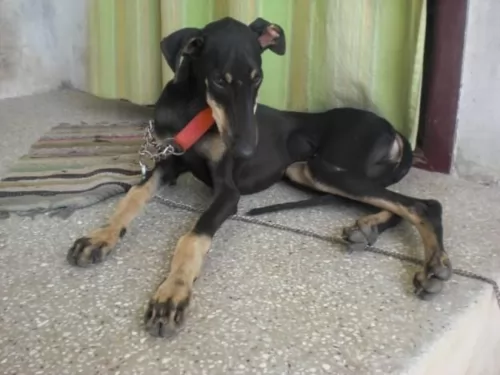 These dogs are tall, slim and deep chested, coming in two-color combinations, but it is the black and tan variety that is the true Kanni. There is also a cream variety. There are other color variations and each color has a unique name connected to it. The coat of the Kanni is short and smooth.
These dogs are tall, slim and deep chested, coming in two-color combinations, but it is the black and tan variety that is the true Kanni. There is also a cream variety. There are other color variations and each color has a unique name connected to it. The coat of the Kanni is short and smooth.
They are medium sized dogs standing at 62 to 67cm at the withers and weighing in the region of 18 – 22kg. When you first look at these dogs you might think of them as being similar to a Greyhound in looks. This is also because of their lean, muscular looks.
The eyes are a golden color, the nose black and the ears are a medium size and floppy with the long tail being semi-curved.
The Kanni has always been a hunting dog so he is used to being sharp, strong-willed, independent and alert as well as having some aggressive tendencies. It is also quite a reserved dog but he shows love and loyalty to his owner. He is independent and easy to train. It is a good thing to have him trained and socialized so that he is obedient to the simple commands you give him.
 Alapaha breed is not just beautiful and unique breed, but they are also great family dogs. They are very loyal, but also very protective and sometimes possessive. Alapaha will require a lot of attention. It is very important to train your dog properly from the early age. A steady and firm hand is important so if you are first time owner, consider having this breed twice. You should not punish your dog, or implement any types of old-fashioned way of training. They do not respond well to that. Overall, they are very smart and quick learners. Alapaha needs to be socialized with other animals from the early age. They can be aggressive towards dogs that they don’t know. At first, you can train them around the house with family and friends, and after the puppy receives all the vaccines, you can start with socialization with other dogs. If you are first time owner and you want this beautiful breed, you should advise with more experienced breed owner. They simply have more experience than you and they know and understand the puppies, so you will receive more accurate advice. Have in mind that every dog has its own personality. Overall, if you train your dog properly you will have a happy and healthy dog that will be amazing with other animals and especially family members.
Alapaha breed is not just beautiful and unique breed, but they are also great family dogs. They are very loyal, but also very protective and sometimes possessive. Alapaha will require a lot of attention. It is very important to train your dog properly from the early age. A steady and firm hand is important so if you are first time owner, consider having this breed twice. You should not punish your dog, or implement any types of old-fashioned way of training. They do not respond well to that. Overall, they are very smart and quick learners. Alapaha needs to be socialized with other animals from the early age. They can be aggressive towards dogs that they don’t know. At first, you can train them around the house with family and friends, and after the puppy receives all the vaccines, you can start with socialization with other dogs. If you are first time owner and you want this beautiful breed, you should advise with more experienced breed owner. They simply have more experience than you and they know and understand the puppies, so you will receive more accurate advice. Have in mind that every dog has its own personality. Overall, if you train your dog properly you will have a happy and healthy dog that will be amazing with other animals and especially family members.
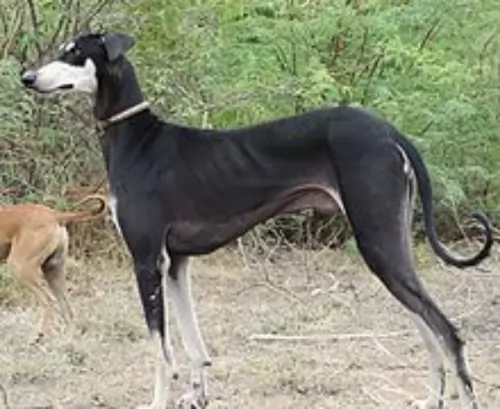 The Kanni looks much like your regular Doberman Pinscher but he has long tail and floppy ears. He is slim and agile but also powerful being able to have bursts of speed. It is why he requires a large place to run and play in, being better suited to a home with a large garden or farm.
The Kanni looks much like your regular Doberman Pinscher but he has long tail and floppy ears. He is slim and agile but also powerful being able to have bursts of speed. It is why he requires a large place to run and play in, being better suited to a home with a large garden or farm.
He is a playful, quiet dog but he has quite a bark on him and is known to be a good watchdog because of this. He is a protective dog too, devoted and loyal and making a splendid family pet.
 Almost every breed has health issues. That doesn’t mean that your dog will have the same health problems that are typical of the breed. If you choose puppy carefully, from the right breed owners, and if you take them to the regular vet checks with proper diet, most likely that you won’t be having any problems. Alapaha’s usual health problems are hip dysplasia, congenital deafness, entropion- this is an eye related problem, and sometimes they can have skin problems too. Again have in mind that this breed is very healthy and they do not have as many problems as regular bulldogs. The best way to protect yourself from getting a sick dog, you can require tests from the breed owners. If they are reluctant to do that, or they are assuring you that they have healthy dogs, have in mind that something is probably wrong. It is the best to choose a puppy with someone who has more experience with this breed.
Almost every breed has health issues. That doesn’t mean that your dog will have the same health problems that are typical of the breed. If you choose puppy carefully, from the right breed owners, and if you take them to the regular vet checks with proper diet, most likely that you won’t be having any problems. Alapaha’s usual health problems are hip dysplasia, congenital deafness, entropion- this is an eye related problem, and sometimes they can have skin problems too. Again have in mind that this breed is very healthy and they do not have as many problems as regular bulldogs. The best way to protect yourself from getting a sick dog, you can require tests from the breed owners. If they are reluctant to do that, or they are assuring you that they have healthy dogs, have in mind that something is probably wrong. It is the best to choose a puppy with someone who has more experience with this breed.
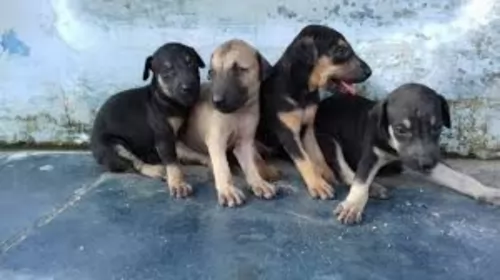 Not much is known about inherited health problems in this breed, and he can live up to a ripe old age of 16. It seems a pretty healthy dog, but still it helps to be aware of some of the more common dog illnesses that your pet can succumb to.
Not much is known about inherited health problems in this breed, and he can live up to a ripe old age of 16. It seems a pretty healthy dog, but still it helps to be aware of some of the more common dog illnesses that your pet can succumb to.
For first time dog owners it can be difficult knowing what health problems our beloved pets could suffer from. Every dog breed has certain diseases to which they are more prone to, but these are some common issues that most of our 4-legged friends will face -
This is a common dog health problem in India with the Kanni. There are so many things that disagree with their digestion. Most dogs may not want to eat their next meal, but when he is lethargic, he is hot and is vomiting, it is time to get your pet to the vet. This is because diarrhea causes rapid dehydration in dogs. To avoid diarrhea, steer clear of certain foods such as milk and dairy products as well as old, spoiled fatty foods. With diarrhea your dog must always have access to fresh, cool water.
This is a common dog disease, and ear infections can be painful and frustrating for your pet. He’ll scratch at his ear, shake his head and the inside of the ear may be red with a discharge. Check his ears for redness and try to keep them free from wax build up and dust.
Cleaning the ear is quite simple, and if you’re not sure how, the vet can do it quickly and effectively. Usually some dog ear cleaning solution on some cotton wool can do the trick. Ear infections are common in dogs like the Kanni with floppy ears.
It is essential to control fleas on your dog from word go. Fleas thrive in warm temperature and humidity and your pet will scratch, bite and lick at the spot. When you brush your pet, look through his fur for fleas and tell you vet about it if you discover ticks and fleas. A topical ointment could nip the problem in the bud. You may want to consider a flea collar for your pet.
Tapeworms, hookworms and roundworms for instance are commonly found in dogs, and even for healthy dogs, deworming tablets should be given from time to time. If your dog has worms, you’ll notice lethargy, loss of appetite, diarrhea and vomiting. It may be time to get your pet to the vet.
 Feeding of this breed variates on the size of the dog and activity. If your dog is big and very active, you will have to feed it more. Overall, 2-4 cups of high-quality dry food would be enough. It is the best if you divide that into 2 meals per day.
Feeding of this breed variates on the size of the dog and activity. If your dog is big and very active, you will have to feed it more. Overall, 2-4 cups of high-quality dry food would be enough. It is the best if you divide that into 2 meals per day.
If you have a puppy, it is the best to feed it 3-5 times per day in smaller portions. That is the best way to develop your dog into a healthy and happy adult. In the first year, you should feed your dog this way.
Grooming Alapaha dog is very easy actually. They have a short coat, so occasional grooming is all that this breed needs. Of course, you can bath your dog when gets dirty, but not too often. With occasional bath and semi-regular brushing, you will have a perfectly clean dog.
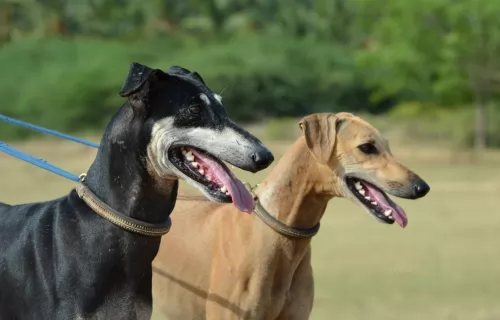 The Kanni is a low maintenance dog with his short coat. You can give him a good brush twice a week, check that his nails don't grow too long and also check his ears inside and out. Ticks and fleas are rife in hot weather and you want to give your dog a thorough check for these. You should also be checking your dog's teeth and brushing them 2 or 3 times a week. Dental problems can cause havoc with your dog's health.
The Kanni is a low maintenance dog with his short coat. You can give him a good brush twice a week, check that his nails don't grow too long and also check his ears inside and out. Ticks and fleas are rife in hot weather and you want to give your dog a thorough check for these. You should also be checking your dog's teeth and brushing them 2 or 3 times a week. Dental problems can cause havoc with your dog's health.
As a hunting breed, the Kanni is used to running so his needs for a good amount of exercise are quite high. While they do make good family pets, they hanker after wide open spaces and being busy. If you own one of these dogs, make sure that you exercise him often because otherwise he becomes frustrated and unhappy.
This dog has always been used to village life where he is free to roam wide open spaces. He is much more suited to country life than to city life, and as a pet, you will need to ensure that he receives a good amount of exercise.
Take him for walks, and if he's been socialized and trained, take him to the park and allow him off his leash to run.
The dog has always been fed traditional food such as porridge and milk but we know better now that dogs need protein too as well as a diet rich in vitamins and minerals to ensure his health.
You can feed him a top quality commercially manufactured dog food and add in some cooked chicken, rice and vegetables from time to time. It is expensive, but if you can, try and add in some raw meat occasionally as well. Your Kanni dog must always have access to fresh, clean water.